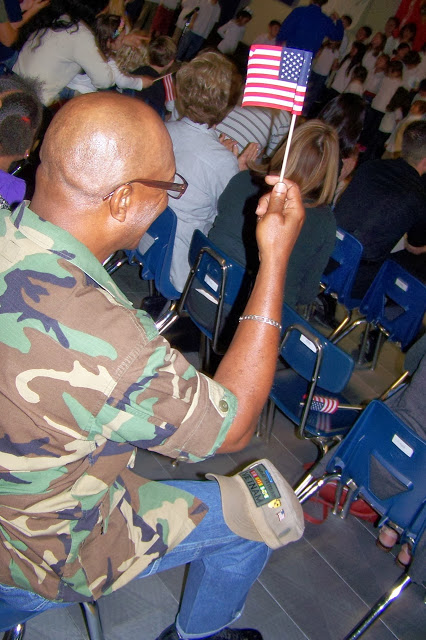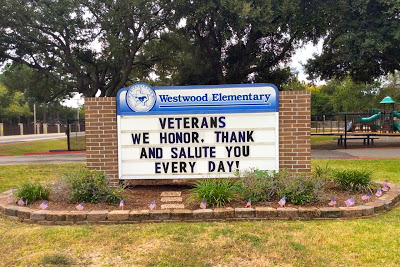by Barbara Gruener
I went back to school a few weeks ago, for the first time since March 10th when life as we knew it came to a screeching halt. And it felt like oxygen to see, feel and breathe in the life in the hallways of the school house again. Standing up together to recite the Pledges in unison took my breath away; the patriotic pride that I experienced unifying as one completely enveloped me. My ancestors actually climbed aboard a ship and sailed from Germany to find their promised land, I mused; what a blessing that they did that for me and what a challenge for me to continue to fight for and uphold their dream for our future.
As another election rolls around and we find ourselves navigating the stormy seas of not only a global pandemic but also social unrest and uncertainty, I’m reminded of the importance of modeling and teaching our youngest leaders to be ‘value-able’ citizens. My favorite definition of citizenship is making wherever you go better because you’re there. From my work with Character Counts!, I’ve learned that good citizens abide by the laws and obey the rules. They conserve precious resources and protect the environment. They are loyal to their country, they stay informed on issues, and they vote in elections. They cooperate, they serve, and they are good neighbors.
First and foremost, the core value of citizenship has to be modeled. Sadly, some of our politicians have recently been struggling to remember that there are impressionable citizens watching us in every interaction and then taking our lead as they march into their future. I’ve definitely met some young student leaders who could help our presidential candidates, for example, show some dignity and respect for one another and their voters as they campaign for votes at their next debate. But that model isn’t exclusive to an emotionally-charged election campaign. As caregivers at home, do we obey the speed limit when we’re behind the wheel? Even when we’re in a hurry? Do we recycle? Even when it’s inconvenient? Do we ever find ourselves in an express line at the grocery store with more items than are allowed? Do we return our shopping carts to the cart corral? Do we sign up to volunteer for that committee that needs our help? These are just a few of the ways that we can model and practice good citizenship.

Beyond our example, here are five suggestions for navigating citizenship with our young people:
Teach them about voting. Despite how troubling a topic politics can be, it’s important to help our students understand that it’s our civic duty to stay informed and to vote. Talk through the issues that each candidate backs and help your students understand the voting process so that they’ll be able to make an informed decision at the polls. Keep your conversations age-appropriate; consider reading Duck For President with your elementary-aged students but go deeper with those teenagers who are getting ready to go to the polls themselves and exercise their right to vote for themselves. Depending on what your state allows, parents can invite their young children to come along and watch them cast their vote, to see democracy in action. This will show them that every registered voter gets a vote, even if their candidate doesn’t win the election.

Equip and empower. Ask children to consider what could be better in their lives and come up with a plan for how they might influence that change. Encourage them to research needs before hosting a betterment campaign. Have them write and deliver speeches or PSAs to share their argument about that cause that needs their assistance and support. Encourage them to campaign for their cause, focusing on what’s right about their cause rather than what’s wrong with the opposing side. Teach them about healthy discourse and practice how to debate issues respectfully, then host a mock debate and election to put their ideas to a vote, to give their village a voice. It’s so important that we acknowledge from little on that ALL voices matter.

Support those on active duty. Another wonderful way to keep citizenship afloat is to support our military personnel. Call for names and addresses of servicemen and women from your community so that you can support friends and family members of your stakeholders. Collect and send basic-need supplies or home-baked treats along with hand-written thank-you notes. Our hometown heroes love getting our ‘Hugs from Home’ and appreciate the treasured gift of cards and letters from school-aged children. As an added bonus, arrange a video chat with one of the recipients of your care packages; click here to feel the excitement that special visit generates for your young citizens.

Honor our Veterans. Want to feel the ripple effects of citizenship? Set aside some time on November 11 to celebrate and thank our Veterans for their service. Start by researching the branches of our military. How many are there and how does each branch serve and protect? Then find out if your students have any family members who enlisted and served. Because safety protocol will keep us from hosting a Veterans Day gathering this year, you look for creative ways to honor, celebrate and thank them. If they can’t come to you, how about you go to them? Have your students record Flipgrid or VoiceThread messages of gratitude and thanks. Or consider hosting a Virtual assembly. Brainstorm questions that you’d like to ask the Veterans, then invite them to a Zoom or Google meeting online. Invite them to share their stories so that our next generation won’t ever forget that freedom simply isn’t free. Consider singing and recording a patriotic song or two, like This Land Is Your Land or God Bless America that you can play in their honor. Finally, make thank-you posters or signs to hang in local businesses and put a thank-you message on your school marquee.

Start a Green Team. Good citizens work with intention to conserve our resources. Find out from your future leaders what they suggest we do to reduce our carbon footprint. Could we ask that our parents to turn off their cars while they wait in the car-rider line. Could you collect plastic sacks and knit them into Plarn mats for the homeless. Maybe you could conserve water by turning it off while brushing our teeth? Or save on the electricity bill by asking students to sign up to be the Watt Watcher for the week and turn off the lights each time the class leaves the room. At my last school, our Green Team Members collected paper recycling from our blue bins in the classrooms each Friday and took it outside to our community Recycling Bin. Money raised from our recycling efforts was used to plant flowering plants for our butterfly garden. What other projects might your Green Team take on?
So many ways to stretch that citizenship muscle, so don’t let the Citizen Ship set sail without you. See you at the polling place.
